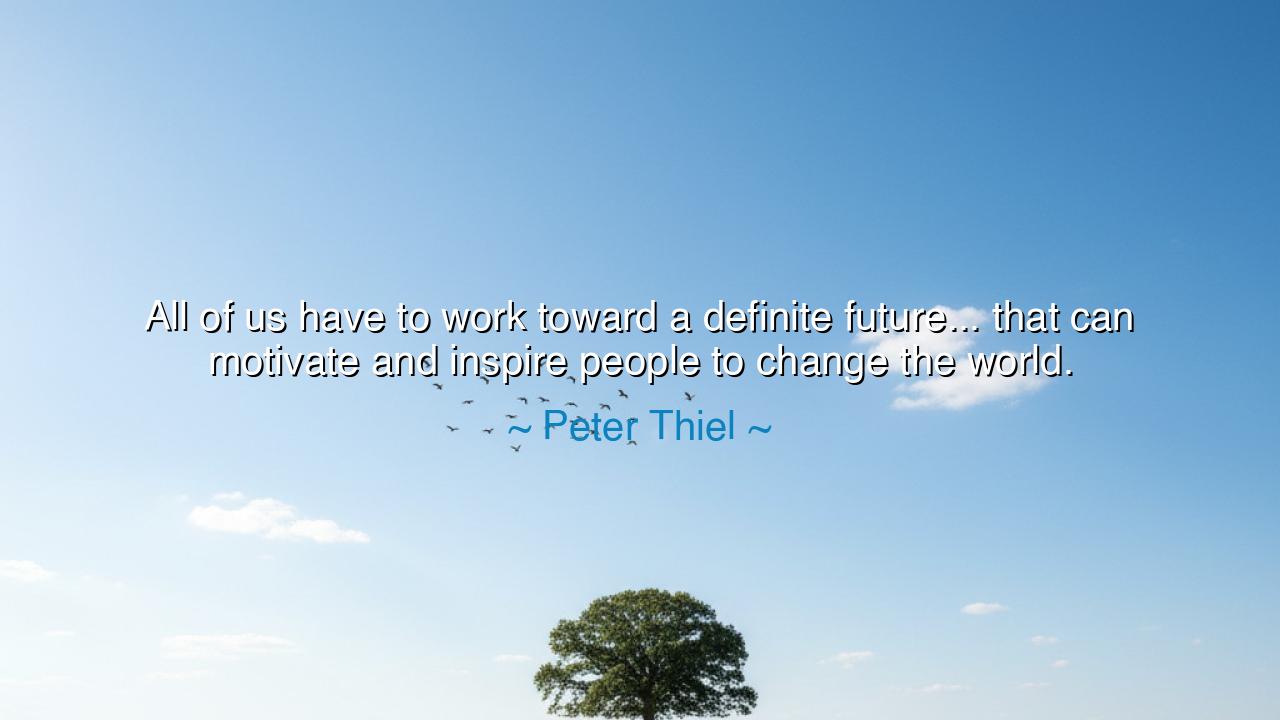
All of us have to work toward a definite future... that can
All of us have to work toward a definite future... that can motivate and inspire people to change the world.






In the words of Peter Thiel, we are called to reflect on the profound responsibility we all share in shaping the future. Thiel speaks not just of personal ambition, but of a collective purpose—a sense that all of us must work toward a definite future, a future that is not merely about surviving or existing, but about inspiring and motivating others to achieve great things. This visionary mindset, as Thiel suggests, is crucial not only for personal growth but for changing the world. It is through our shared effort, our commitment to a common goal, that we can unlock the potential to transform society, to build something greater than ourselves.
This idea of working toward a definite future is ancient in its roots, stretching back to the philosophers of ancient Greece. Plato in his Republic envisioned a society built on the virtue of its citizens, each contributing to a greater good through their pursuit of knowledge and justice. Plato believed that a well-ordered society could only come to fruition when individuals worked toward a collective, greater purpose. This was not merely a theoretical ideal, but a call to action—an invitation for each person to contribute to the shaping of a future that is just and good. Thiel’s words echo this call for a shared vision, one where each person takes an active role in working toward something that will benefit not just themselves, but the world at large.
Similarly, Aristotle, another great Greek philosopher, recognized that humans are social animals, destined to live in communities. In his Nicomachean Ethics, he argues that the highest form of human flourishing, eudaimonia, is achieved not in isolation but through engagement with others. Aristotle believed that virtue and goodness could only truly manifest in a society working toward common goals, where individuals contribute to the wellbeing of the collective. Thiel’s vision of a motivating and inspiring future, where each person plays their part in creating lasting change, aligns with Aristotle’s understanding that we are at our best when we are part of something greater than ourselves.
History is replete with examples of individuals who have worked toward a definite future, transforming not just their own lives but the world around them. One such figure is Mahatma Gandhi, whose vision of a free and just India was not just a political goal but a moral and spiritual mission. Gandhi’s determination to achieve independence through nonviolent resistance inspired millions to believe that change was possible and that the future could be shaped through collective action and moral courage. He recognized that a future worth striving for required more than just political change—it required a shift in the very hearts and minds of the people. Gandhi’s work serves as a reminder of how a single individual, working toward a definite future, can motivate and inspire an entire nation to change.
Similarly, Martin Luther King Jr. exemplified the power of working toward a future defined by justice and equality. His famous "I Have a Dream" speech captured the essence of his vision—a future where all people, regardless of their race or background, could live in harmony and equality. King understood that real change required more than just legislation; it required the hearts of individuals to be transformed by a shared vision of a better world. His leadership in the Civil Rights Movement was not just about achieving tangible goals but about creating a vision that inspired people to join in and work toward that future together. Like Thiel’s call for collective action, King’s life shows how visionary leadership can spark movements that change the world.
The lesson here is clear: collective effort, fueled by a shared vision of a better future, has the power to change the world. Thiel’s insight reminds us that we must work together, not merely for personal gain but for the greater good. Whether in business, politics, art, or social change, we must look beyond the immediate and focus on the future we want to create. A definite future is not just an abstract concept; it is something we actively shape through our actions, our decisions, and our commitment to a common goal.
In practical terms, this means that we must not only dream of a better future but also take the necessary steps to bring it into being. It’s easy to be consumed by the present moment, by immediate concerns and distractions. But the future requires a different kind of focus—one that is driven by purpose, collaboration, and a willingness to sacrifice for the greater good. Like the ancients, we must see ourselves as part of something larger, something that can only be achieved through shared effort. Each action we take, no matter how small, should be done with the knowledge that we are contributing to something far greater than ourselves—a future that is worth striving for, a future that inspires and motivates others to join in the journey.






AAdministratorAdministrator
Welcome, honored guests. Please leave a comment, we will respond soon